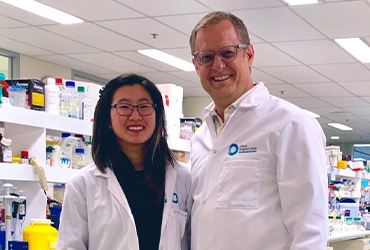From Tragedy to Treatment: Dr. Ashleigh Poh on Impact of AACR Gastric Cancer Research Fellowships
The AACR Gastric Cancer Research Fellowships represent a joint effort to encourage and support postdoctoral or clinical research fellows to conduct gastric cancer research and to establish a successful career path in this field.
A post-doctoral fellow at the Olivia Newton-John Cancer Research Institute, Australia, Ashleigh Poh, PhD, received one of the gastric cancer research fellowships given in 2018. She set out to investigate the role of Hematopoietic Cell Kinase (HCK) in gastric cancer. Dr. Poh shared how her AACR fellowship made an impact on her research and career.
What has inspired you to focus your research on the development and progression of cancer?
My grandmother and aunt were diagnosed with cancer when I was in high school and passed away shortly after. It was devastating – a cancer diagnosis doesn’t only affect the person with cancer, but also friends and family. These experiences reinforced my belief that we need better ways to diagnose, manage, and treat cancer.
What do you consider the most important scientific advance(s) made, at least in part, because of your AACR-supported grant?

My research focuses on understanding how cancer cells hide from the immune system, which allows them to grow undetected and spread from their initial site. I’m also interested in developing drugs that can make the immune system recognize and destroy cancer cells more effectively.
We have identified a novel drug target, called HCK, which is expressed in a type of immune cell known as a macrophage. Macrophages can play two significant but mutually exclusive roles – they can act as “garbage collectors” to remove unwanted debris or damaged cells, or as “nurses” to facilitate regenerative processes.
With the AACR-supported grant, we were able to demonstrate that macrophages with more HCK activity are better at helping gastric tumours grow and spread. Rather than acting as garbage collectors that clean up cancer cells, these macrophages ‘nurse’ the growth of gastric tumours and hide them from being detected and destroyed. We also showed that treatment of mice with an anti-HCK drug inhibits gastric tumour growth.
How has this grant allowed you to pursue research that would not have been otherwise possible?
As an early-career investigator, the Debbie’s Dream Foundation-Stupid Strong-AACR Gastric Cancer Research Fellowship provided me with crucial seed funding and the invaluable opportunity to develop and manage my own independent project.
Please briefly describe the effect, if any, of being an AACR-supported grant recipient may have had on your career. For example, additional funding, increased collaboration opportunities, etc.
Thanks to my AACR-supported grant, I’ve been able to build strong collaborative networks with experts in the tumour immunology field, gain expertise in new techniques and skills, and present my work overseas. We also published these findings in the AACR journal Cancer Immunology Research, which has helped attract additional grant funding to continue our research. Our discoveries have also leveraged major industry-related partnerships to develop anti-HCK drugs for clinical use.
Since 1993, the AACR grants program has contributed to the development of new and improved approaches to cancer treatment and cure. What is your vision for the future of gastric cancer research?
The development of more non-invasive diagnostic tools, and continued identification of predictive/ prognostic biomarkers for personalized medicine.